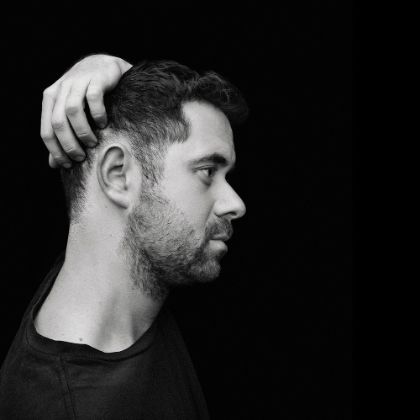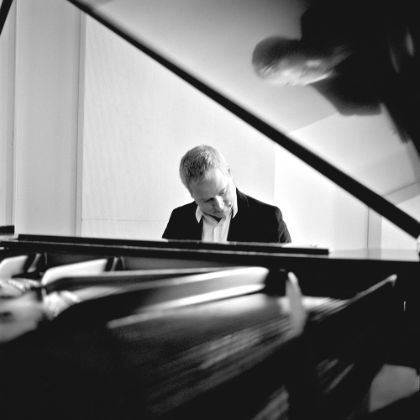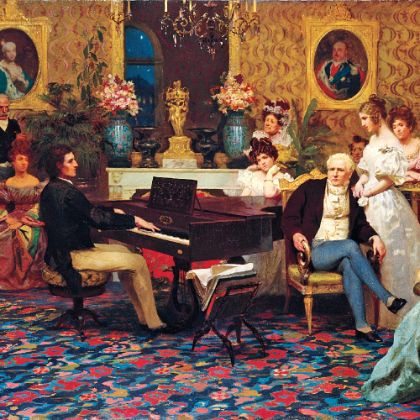listen magazine feature
Adventurous as a pianist and composer, Conrad Tao is reshaping the image of the piano virtuoso for the twenty-first century.
By Thomas May
HIS NAME HASN’T changed, but mentally splicing the twenty-three-year-old Conrad Tao with the child prodigy who first came before the general public more than a decade ago is likely to make you do a double take.
In 2004, Tao appeared for the first time on the long-running NPR series From the Top, which spotlights young musicians. Could this ten-year-old, who was joined by a fellow prodigy to play his own Sonata for Two Pianos, really be the same person who conceived the electro-acoustic concerto An Adjustment for piano and iPad (commissioned by the Chamber Orchestra of Philadelphia in 2015)? The latter combines Tao’s keyboard artistry with an electronic soundscape — all interwoven into exchanges with the orchestra. Philadelphia Inquirer critic Peter Dobrin praised this multilayered work, which encompasses the composer’s experiences with depression, for integrating “in the most imaginative way the current style of spiritual post-Romanticism and ’90s techno club music.”
A pianist and composer whose default setting is to seek out innovation, Tao has gotten used to reactions of surprise by those previously unaware of his precocious background. “I’ve discovered that a lot of people don’t know what my age is, especially older colleagues” says Tao, a steinway artist since 2013. “That’s been a nice development. When I was sixteen or seventeen, all I wanted to do was shed that label and get rid of the p–word.”
In Das Wunderkind (1903), one of his early stories, Thomas Mann memorably captured the subtly oppressive constraints that accompany the prodigy phenomenon — the performance is as much about the observers as the observed. The story, in which Mann dramatizes a piano recital by his eight-year-old child protagonist, Bibi Saccellaphylaccas, shows how prodigies can become screens onto which we project our own often comically divergent preoccupations. Before he dives into the “inviting ocean” of his music, Bibi theatrically acknowledges his audience: “A breathless stillness reigned in the room — the tense moment before the first note came….”
The Sonics of Effort
Tao has been complicating the familiar model of anticipation and spectacle — whether the pianist is a prodigy or an aging legend — by interrogating assumptions about virtuosity.
“There is definitely a benefit to things seeming effortless — the primary way we understand virtuosity — because that reaffirms the notion of the music speaking for itself. But that is not the only truth available to us in music-making.”
Another truth that fascinates Tao emerges with the topic of virtuosity — of musical performance that ruptures the illusion of smooth, effortless surfaces: “Embedded in virtuosity is this emotional charge and excitement of wondering whether or not this is going to work; it’s not about regurgitating a loaded page of black dots. I’m interested in the sonics of effort. A recent theme in my writing has been the various artifacts produced by effort. Audible artifacts of effort can be generative and surprising and beautiful as well.”
‘I struggle with the holier-than-thou attitude of purism that views music as a disembodied thing....’
Periodically in music history, there seems to come to the fore a Puritan tendency to denigrate virtuosity as superficial display and theatrics. It was, for example, a by-product of high-minded, purpose-driven Modernism. “I struggle with the holier-than-thou attitude of purism that views music as a disembodied thing and ignores the insistently present aspect of music-making,” Tao says.
It makes sense that the former prodigy who wanted to put that pigeonhole behind him as fast as he could shows a profound affinity for Mozart. Tao instantly alights on that composer as his prime example of where the purists get their values all wrong. “He’s so often thought of as a sacred cow. But what I like about playing Mozart is that he can be so cheeky and borderline manic, so full of obsessive energy and overflow that he pushes things to the edge.”
Mozart is another example, in other words, of the sense of effort that is glossed over by interpretations that idealize concepts of balance. “We have this perverted notion of Mozart being ‘polite.’ Take a look at the scores, and you realize that is not true.”
While there is justification to be skeptical of virtuosity as a mere high-wire act, “it can also be reactionary to say virtuosity is not important at all and to write it off completely. The more honest response is to consider: why is virtuosity prioritized? When it is, what has been compromised, if anything? It seems intellectually truer to grant virtuosity status as a part of making music. If it’s an artifact of that, you can engage with it.”
"It can also be reactionary to say virtuosity is not important at all and to write it off completely. The more honest response is to consider: why is virtuosity prioritized?"
A work that figures prominently on Tao’s schedule this season is the fearsome Second Piano Concerto of Sergei Prokofiev. “I love how it almost teeters at the edge of impossibility and collapse. It’s a major undertaking for me, which I’m doing in Bern, Switzerland, and Seattle and also Utah, with Karina Canellakis.”
And engaging with the limits of virtuosity is precisely what Tao has been doing in his own recent compositions as well. In April, Jaap van Zweden led the world premiere of swallow harbor, his second commission for the Hong Kong Philharmonic, where Tao has been serving as composer-in-residence. “It’s an attempt to write music about that sonics of effort,” he explains. On one level swallow harbor is a portrayal of Hong Kong’s “jagged skyline” that, according to his own program note, aims to convey what is “pulsating and organic at the heart of this seemingly impossible city.” But Tao also points out that the piece is “designed to be not quite together. So the performance challenge is to play around the pulse, where almost no one actually plays the pulse. There are some rhythms in the score that are almost silly to write in an orchestral piece, because they can’t be played. The sound of musicians having to try hard and working on the brink of potential collapse is an idea influenced by being exposed to the New Complexity.” swallow harbor translates the effort of playing into notational form. Writing music that is so complex that it demands a certain creativity on the part of the performer is not a one-way street.”
Tao is drawing on his experiences as a performer for his orchestral compositions. He cites Franz Liszt as an example of a composer who demands this kind of performative creativity. “Not all of Liszt, but I would say it’s the only way to approach the more meat-and-potatoes Liszt. You approach it by taking virtuosity as the text of the work — not as the register at which you play, but as a deliberate choice and guiding force for your interpretation of the work.”
Pushing the Piano Beyond Itself
The path of least resistance has never been Tao’s way. Even gravitating toward the piano involved a virtuosic detour. Born in 1994 in Urbana, Illinois, to parents who emigrated from China and became scientists, Tao was only four when he gave his first piano recital. But before long he was also winning awards as a prodigy violinist. He began studies at Juilliard’s Pre-College Division while still in his single digits, eager to continue his training on both instruments. For several summers he participated regularly as a violinist in the Aspen Festival Orchestra. Aspen was an especially formative influence on his artistic development, he adds.
Yet Tao recalls that he “never had any delusion about my abilities as a violinist,” calling the violin “a finicky instrument” in ways he wasn’t ready to accept. After playing a series of concerts in which he was the soloist for two Mendelssohn concertos — the Violin Concerto as well as the G minor Piano Concerto — he decided at the age of fourteen to give up the violin, wary of being perceived as a mere novelty act. “I didn’t want being a soloist on two instruments to define what I do, as opposed to the fact that I’m just making music.”
The piano was the instrument on which Tao discovered music to begin with (before he was two years old), and while the family was still in the Chicago area he studied with Emilio del Rosario in Chicago; later, in New York, Yoheved Kaplinsky and Choong Mo Kang became mentors. Yet already at nine, composition officially entered the mix as well when Tao began taking lessons with the composer Christopher Theofanides. “We’d spend time listening intensely to pieces I was exploring and discuss them. It was a wonderful way to be exposed to different languages and hit at just the right time. Otherwise you start to compartmentalize and categorize.”
From an early age, Tao’s thinking as a composer became intertwined with and affected his approach to the piano. “I was already enjoying the experimentation process in those times. I love the piano but I don’t love piano sound, per se. I try to think about timbre beyond the piano’s default sound. Part of my project as a pianist is to push the instrument to sound more like the orchestra.”
Another endeavor in which Tao has been exploring his relationship with the keyboard is chamber music. He recently formed a trio with violinist Stefan Jackiw and cellist Jay Campbell (the new cellist of the JACK Quartet). For now they call themselves the JCT Trio (pronounced “junction”). Because of the demands of their respective solo careers, “we all started out this project with the knowledge that it’s always going to be a part time thing for us. But good chamber music is the best music-making in the world. I wish it were a huge part of my playing.”
What bonds brought them together? “They’re both thoughtful, smart musicians who are very good at distinguishing the forest from the trees, and they’re not as caught up with the industry as others.”
And because Tao places so much emphasis on unconventional programming for his own solo recitals, the JCT Trio has become an oasis for now where he can focus on more traditional repertoire.
“Going back to the old repertoire from the new, where you do have to interrogate everything you thought you knew about your instrument, can be so enlightening. It’s this process of expanding the vocabulary beyond the tyrannical notion of what music of the past should ‘sound like.’ This is coming up for me more and more with Mozart. Instead of worrying about whether my playing is a facsimile of what Mozart is supposed to ‘sound like,’ where I don’t have to make choices, I’m focusing on issues of musical intention, phrasing and gesture, my physical approach to the instrument.”
Ultimately, Tao says he identifies most with his role as a performer at this — still very early — point in his career. “I feel more decisive as a performer, and everything I am writing now is connected to some aspect of performing that I find of interest.”
This article originally appeared on listenmusicculture.com, Steinway & Sons award-winning magazine.
related...
-

Piano Became My Confessor — Jean-Michel Blais
Jean-Michel Blais on his music, his Tourette’s, and finding his Steinway Sound.
Read More
By Justin D. Joffe -

Freezing a Moment of Infinite Possibility
Pianist Jeremy Denk on the stakes of recording Bach’s Goldberg Variations
Read More
By Thomas May -

Built to Last
Chopin turns two hundred, with authority.
Read More
By Jed Distler